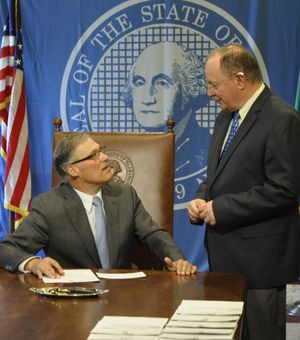Inslee signs autopsy bill
Gov. Jay Inslee and Sen. Mike Padden talk before the autopsy bill is signed.
OLYMPIA – Spokane County’s medical examiners should feel free to talk about the results of investigations into deaths that involve actions by law enforcement officers. Gov. Jay Inslee signed a bill Monday allowing county medical examiners and coroners to discuss the results of autopsies and post mortems of people who die in encounters with police or while in jail.
To read the rest of this item, or to comment, continue inside the blog.
Spokane County Sheriff Ozzie Knezovich, who had lobbied for the bill after saying he’d been unable to explain some cases involving his deputies, sent a letter urging Inslee’s signature.
“By doing so, we will be able to provide the public with critical information and preserve the public’s trust in its law enforcement,” Knezovich said, according to a statement released by Sen. Mike Padden, R-Spokane Valley, the bill’s prime sponsor.
Although the bill passed unanimously in the Senate and House, Padden said there was a last-minute effort by some coroners to get Inslee to veto it. He said they may have misunderstand the colloquy – a bit of legislative theater designed to spell out the purpose of the bill – Padden had with Sen. Adam Kline, D-Seattle, before the final vote. In that discussion, Padden and Kline tried to make clear the bill was intended “to protect the ability of a coroner or medical examiner to discuss cases, not limit it.”
The law that keeps the records and other papers from autopsies confidential remains in effect. There are no restrictions on discussing the findings of other deaths they investigate that don’t involve law enforcement or incarceration.
Spokane County officials pushed for the bill after several high-profile deaths involving law enforcement. In one case last September, Knezovich insisted deputies responded appropriately when they shot a man who they mistakenly thought had a weapon, but orders from the medical examiner’s office kept him from commenting further.
In most counties, medical examiners and coroners see no legal barriers to talking about those investigations, Kline said last month. In Seattle and King County, deaths involving law enforcement or persons in custody go to a public inquest “as a matter of course,” he said.
Spokane Police Ombudsman Tim Burns, Knezovich and representatives of the Center for Justice have supported inquests for those cases in Spokane. Medical Examiner John Howard opposes the idea, saying they would be “public spectacles” that would waste public resources.

